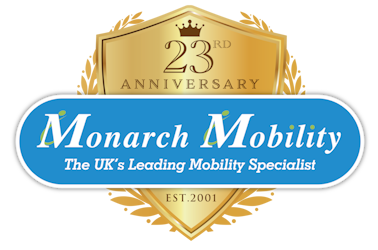As scooter use becomes more prevalent in today’s society, we understand that some of the rules and regulations regarding taxing and insurance can be confusing. We aim to take out the confusion by talking through the regulations and providing recommendations to make any scooter or powerchair purchase as smooth and straight-forward a process as possible; this is especially important when it comes to taxing and insuring your mobility product.
Although there is no cost, and no longer a tax disc, any Class 3 (Road-Legal) mobility scooter or powered wheelchair must be registered with the DVLA as an invalid carriage for the use of a disabled person. To be a Class 3 mobility scooter or powerchair the weight must exceed 116kg and have a top speed of more than 4mph. Many scooter users believe that if they do not use their mobility product on the road then they will be exempt from registration or taxing, but this is a common misconception. Furthermore, if you have any insurance policy for your scooter and it is not registered and taxed then this may invalidate your insurance leading to unexpected costs should you be involved in an accident. It is also worth noting that you must be over the age of 14 to tax and use a Class 3 mobility vehicle on the road legally.
Insurance for mobility scooters is not currently a legal requirement, this is something that both Monarch Mobility and the British Healthcare Trade Association are lobbying to try and change. Following clarification of certain EU regulations, the matter of insurance on mobility products has recently gained some press coverage, which may result in insurance soon becoming mandatory.
We strongly recommend that all scooters and powered wheelchairs are purchased in conjunction with an insurance policy, as any policy purchased will ensure that the mobility aid, the user, as well as others, are adequately covered should any problems or incidents arise (you will be covered in certain conditions, so please read your chosen provider’s policies in detail before making any commitments). This cover can start from as little as £79 per annum and policies can also be upgraded to include breakdown cover.
At Monarch Mobility, we will take away the hassle of taxing and registering your vehicle, by completing and sending all the relevant forms off to the DVLA on your behalf; our mobility specialists will also provide detailed information regarding our insurance policies through Mark Bates Insurance for you to consider while you test the mobility scooter or powered wheelchair in your free no obligation home demonstration.
This advice was provided by Andrew McAlpine (Mobility Specialist) and Chris Hill (Trade BDM) at Monarch Mobility.
We have a range of purchasing options available, such as our interest free finance packages.
We also provide information on VAT exemption; who can qualify, how to apply etc. more information about this can be found here.
If you would like to discuss the payment options available, please call us or complete the form below.
Here at Monarch Mobility we like to consider ourselves one of the UK’s leading suppliers of lithium battery powered mobility products. Over the years since we first brought the Mobie to these shores, it was apparent to us that there were some differences in how the power source should be maintained. The lightweight nature of the lithium battery inspired us to expand our range which now includes the Genie, Indi-lite and our best seller, the automatic folding scooter, the Smarti.
We have found that when you first purchase your lithium battery powered mobility scooter, your product should be given a full 24-hour charge and then be drained by use (this does not have to completely drain the battery cell, but should at least be down to the last three red indicators on the tiller display). For best results, this process should be repeated 2-3 times, in order to ensure that a good deep-cycle charge and use pattern is established.
Following on from this, every time the scooter has been drained of power, we would suggest an overnight charge (8 to 12 hours) and for lighter, more intermittent use or when in storage, we recommend an overnight charge at least twice per week, in order to maintain and protect the battery.
Your battery will be better maintained if it is charged for a period of at least 8 to 12 hours, which is what we class as ‘an overnight charge’. The battery charger indicator may change to green but this does not necessarily mean a full charge has been achieved – the remaining charge time will enable an even further charge and a process which effectively cleans and maintains the battery.
As with any battery, lithium will deplete even without use, so if you purchase a second battery with your scooter then you should try to alternate evenly between the two. If it helps, we suggest labelling your batteries to avoid confusion.
In addition, another factor that will impact your battery is the climate. Your battery will not preform to its optimum capability, especially during the cold weather, so where possible, one way to try and combat this would be to charge the scooter indoors, where conditions would be ideal and the battery is not at risk of freezing overnight (as it could in an unheated garage or shed). Another suggestion is to purchase an Off Board Docking Station which is used indoors to charge the battery, which helps if you have limited space or if you prefer the ease of leaving your scooter in the car. You can read more about maintaining your mobility scooter in the winter here.
Finally, anyone using a lithium battery powered mobility aid must be aware that this is only one aspect of the scooter or power-chair and in order to continue getting the best out of the battery the scooter must be kept clean and regularly maintained. We recommend an Annual Service to check the machine is running correctly and 100% safe.
We at Monarch Mobility want you to get the most from your mobility scooter or powered wheelchair and feel if you follow these guidelines correctly the battery will provide a better performance and will help to extend the battery life.
This advice was provided by Chris Hill, Trade BDM at Monarch Mobility.
More people now have access to the internet than ever before, which provides an overabundance of easily accessible information for consumers; more knowledge, more opinions, more reviews and ultimately more choice. This wealth of information can sometimes lead people to buy mobility products online, due to the ease of use for the sometimes vulnerable or elderly customers who do not have the levels of mobility and independence that they would like.
However, whilst information online has undeniable benefits, for the mobility sector it provides some information, but not always the correct information and experienced representatives, such as Monarch Mobility’s Mobility Specialists, who offer free no obligation home demonstrations, should always discuss the needs and requirements of each individual user, in order to advise them on the best possible mobility scooter or powerchair available for them on an individual basis. It can never be as easy as a one-rule fits all, due to the different disabilities and levels of mobility we all see on a daily basis.
To make sure that we deserve that feeling of gratification when we supply someone with a product that is going to enhance their mobility and offer them a new found freedom, the experience for both the mobility specialist and customer should be a positive one. As a bare minimum the discussion between the mobility specialist and the potential customer should include a face-to-face conversation about access, storage, security, portability, manoeuvrability, charging procedures, ongoing maintenance, servicing, insurance, warranty and the provision of a purposeful test drive. This should take place during a home assessment and ideally with loved ones or friends in attendance, so that the potential customer is completely at ease and comfortable. Only then will the customer get the high-level of customer service and the positive experience that we as a company always aim for.
Our Motability scheme is seen by many to offer and promote the highest level of customer service, which includes a dedicated home assessment and demonstration by a qualified mobility specialist; this covers all of the aforementioned considerations and furthermore considers how our customer’s condition will continue to affect them going forward.
We are not saying that the use of the internet is a bad thing in the mobility products industry, far from it in fact, but it is just a small part of the overall experience that any customer should have, and will never replace the benefits of the mobility specialist.
This advice was brought to you by Jamie Holmes at Monarch Mobility.
Mobility Scooter Checklist
Before you go to buy a new or used mobility scooter, it’s a good idea to get prepared with a checklist of what your specific needs are, and also what questions to ask the vendor. It is an important decision and you want to get it right first time. With this handy guide you will be armed with the most important things to consider, so you can be sure of investing in something suitable.
How to choose a suitable mobility scooter
With a range of makes, models and types of scooter, there’s a lot to consider. Once you know what your specific requirements are, and you’ve made a checklist, you should be able to zoom in quickly on the relevant model for you, but here are a few more pointers, in case you’re having trouble narrowing it down.
Mobility scooter buying guide
Just like making any high value purchase, you will want to be confident that you are getting good advice and a good quality, suitable mobility scooter. To put it simply, you want to buy something you can ride on, but you don’t want to get taken for a ride. Check out the buying guide for tips on what to expect, and what to insist on.
Free Home Demonstration
One of the key aspects of buying a mobility scooter is a test drive. It’s no use just looking at pictures and reading specs in a brochure. Even looking at models in a showroom can only get you so far. But it may not be easy to get out and about to visit a showroom until you have bought your mobility scooter. That’s where Monarch’s home demonstration service comes in handy. Let them bring the scooters to you, take a test drive, make sure you are comfortable and can use the controls. With no obligation and no pressure.

